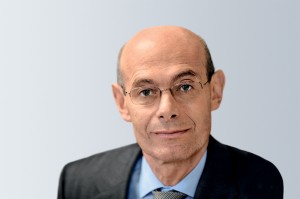
After more than 40 years of operation, DTVE is closing its doors and our website will no longer be updated daily. Thank you for all of your support.
The Digital TV CEE Q&A: Andreas Rudas, RTL Group
 Ahead of the forthcoming Digital TV CEE conference in Prague, DTVE interviews Andreas Rudas, executive vice-president, regional operations & business development, central & eastern Europe and Asia
Ahead of the forthcoming Digital TV CEE conference in Prague, DTVE interviews Andreas Rudas, executive vice-president, regional operations & business development, central & eastern Europe and Asia
What are the main challenges facing free-to-air broadcasters in CEE and what are they doing to address these? The TV industry in general faces three main challenges: first, increasing competition, with “more TV” than ever before. Not only more TV channels, but also more and more distribution platforms, TV screens, devices, and more players entering the TV business. Second, digitisation leads to profound technological changes, with the merging worlds of television and internet as a main driver. And third, a certain shift in consumer behaviour, with rapidly growing consumption of non-linear or “on-demand” TV. In view of these challenges, we at RTL Group have developed a clear strategy – we will rely on our strength, expertise and creativity while working constantly to further develop our business model. This includes a variety of measures: building strong families of channels, investing in local content, establishing a strong presence on all digital platforms with our own catch-up TV services and mobile applications, and developing new, innovative forms of advertising to complement the classic 30-second commercial.
What are your expectations for the advertising market in the region over the coming year? There’s is no visibility right now.
How well placed are broadcasters to diversify their revenue streams through subscription and other digital services? One focus of RTL Group’s growth strategy is a significant increase in non-advertising revenue. There are many ways to achieve this. For example, establishing a second revenue stream. RTL Group aims to eventually receive a fair revenue share for its brands and programmes from the major distribution platforms – cable network operators, satellite companies and Internet TV providers. For new services such as high-definition TV channels, on-demand platforms and digital pay channels, and also for the signal of the major free-TV channels, since these form the basis of the platform operators’ business. Developing a profitable business model for non-linear TV services will be another important task for TV broadcasters in the years ahead. A model that offers the right mix of free, advertising-funded services and paid services. Customers could, for example, pay for exclusive content, for advance access to series episodes before they are broadcast on TV, and for programmes from the archive. Our content production arm FremantleMedia also plays a key role in strengthening our non-advertising revenue streams, and RTL Group wants to grow this business significantly across all markets. Finally, RTL Group will continue to work on diversifying its businesses by leveraging its own brands. Examples include the mobile communications cooperation between M6 and Orange, live events, casual games tying in to TV formats, and e-commerce and rights trading.
What are RTL Group’s main goals in the CEE region and what is it doing to achieve these? Everything that we’ve defined as success factors for our strategy we also do in the CEE region. With the launch of RTL 2 in Croatia and the acquisition of seven cable channels in Hungary we are building and extending our families of channels in these countries. We offer online catch-up TV services with RTL Most in Hungary and RTL Sada in Croatia, and both broadcasters are steadily expanding their mobile services. Geographical expansion in high-growth regions also remains on RTL Group’s agenda. With participations in ten countries, we already have a well-balanced portfolio. Not least against the backdrop of this strong presence in the European TV markets, RTL Group is careful with its investment decisions. If, however, the company identifies a target that will help implement its strategy and create value for the Group, then the management team will pursue it.
What topics do you think will produce the most interesting debates at Digital TV CEE? For me, it’s always very interesting to see whether all the debates about the future of TV in the digital world and about new entrants revolutionising the business will reflect the astonishing strength, resilience and flexibility the TV industry has demonstrated in the past. Let’s not forget that TV viewing continues to grow because people love to be entertained and thrilled by captivating stories. If the industry continues to play to this strength, TV will remain the leading medium in the digital world as well.
Digital TV CEE takes place in Prague, the Czech Republic from June 26-28. Click here for more details.